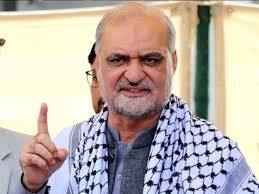ISLAMABAD: Finance Minister Muhammad Aurangzeb on Wednesday addressed a post-budget press conference where he defended the government’s fiscal measures, responded to criticism on online shopping taxation and salary adjustments, and unveiled steps to broaden tax enforcement and boost exports. The event, however, began on a contentious note, with journalists staging a walkout over the absence of a technical briefing on the Finance Bill 2025.
At the outset, reporters voiced their frustration for not being provided a detailed technical briefing of the finance bill by the Federal Board of Revenue (FBR), a customary post-budget practice. Despite the protest and partial walkout, the press conference continued with the minister flanked by FBR Chairman Rashid Mahmood Langrial and Finance Secretary Imdadullah Bosal.
Online shopping taxation and salaried class relief:
One of the major themes of the press conference was the taxation of the growing digital economy. Chairman FBR Rashid Mehmood and Member Inland Revenue, Dr. Najeeb Ahmad, explained that e-commerce, particularly in high-value retail categories like electronics and fashion, was being streamlined for tax collection.
“Items priced below Rs20,000 sold online are taxed at 0.25%, while boutique fashion items with higher margins are taxed at 2%,” he said. He emphasized that different rates were applied based on actual profit margins and sectoral realities, rather than applying blanket rates. Grocery items, with lower margins, faced a slightly higher effective rate.
He also noted that earlier, online cash-on-delivery transactions weren’t being properly documented. “Pakistan is at risk of losing its digital sales tax rights globally as vendors mislabel cross-border digital sales as exports to evade taxes,” he cautioned.
Minister Aurangzeb added that two significant measures were being introduced to bring Pakistan’s estimated Rs9.4 trillion cash economy into the tax net.
Addressing concerns of the salaried class, the minister reiterated that their relief measures were “symbolic but significant.” The government has proposed a 10% raise in federal salaries and 7% in pensions, linking them to inflation trends. Responding to questions about why the minimum wage remained unchanged at Rs37,000, he said the government sought feedback from industries before making adjustments.
“This budget is a signal to the salaried and formal sectors that the government recognises their burden,” Aurangzeb said, while highlighting a 0.5% reduction in super tax on the corporate sector as another supportive measure.
Tariff reforms for export growth:
Aurangzeb emphasized that tariff rationalization was a core part of the National Tariff Policy, aimed at promoting an export-led economy. “We’ve removed additional customs duties in four lines and reduced them across 2,700 tariff lines directly linked to raw materials for exporters,” he said, noting this was a phased approach with more reforms to follow.
Calling it “an East Asia moment” for Pakistan, he asserted that while revenue concerns existed, the direction of policy was to make Pakistan globally competitive.
Journalists’ protest and assurance of engagement:
The absence of a technical briefing on the Finance Bill led to tension at the start of the press conference. Journalist Mehtab Haider raised the concern, leading many mainstream reporters to walk out.
Responding to this, FBR Chairman Langrial said the briefing was “essential rather than technical” this time, as it often repeated content discussed during the ministerial session. He assured journalists of a separate technical session going forward.
Aurangzeb also expressed regret for any discomfort caused, adding: “We’ll institutionalize regular media interactions every four to six weeks.”
Responding to the protest, Federal Minister for Information Attaullah Tarar attempted to de-escalate the situation. Addressing the remaining members of the press, he said, “The concerns raised by journalists are absolutely valid. This is their right, and we fully acknowledge it.”
Tarar confirmed that the absence of a technical session was a lapse and apologized on behalf of the government. He assured the press that the FBR chairman had been informed of the issue and had committed to conducting the session at the earliest.
“I will speak to the FBR personally. The technical briefing must take place — this is a longstanding tradition and an important step for transparent communication,” Tarar said. He also noted that he stood in solidarity with the protesting journalists and appreciated their professionalism in raising the matter peacefully.
Following Tarar’s public apology and assurance of a forthcoming technical session, the journalists agreed to end the boycott and returned to complete coverage of the finance minister’s post-budget briefing.
The incident underscores mounting concerns among the media community about shrinking access to official information and procedural opacity in fiscal policymaking. Several journalists later commented that with wide-ranging tax proposals affecting businesses, salaried individuals, and traders, the absence of a detailed pre-briefing could lead to confusion, misreporting, and public misunderstanding of budgetary measures.
No new tax on fertilisers, solar panels tax clarified:
Discussing agriculture, the finance minister said proposed taxes on fertilisers and pesticides were waived after negotiation with the IMF, acknowledging them as critical inputs.
FBR Chairman Langrial addressed another contentious issue, the 18% sales tax on imported solar panels, stating it was meant to protect local assemblers and ensure a level playing field. “We had to discourage import of fully assembled panels which harmed local value addition,” he said.
Welfare spending, fiscal consolidation, and provincial transfers:
Aurangzeb stressed that the budget reflects tight fiscal consolidation under IMF guidance, yet aims to maintain targeted welfare spending. He defended the hike in salaries for the National Assembly speaker and Senate chairman, noting they were last revised in 2016.
On overall government expenditure, the minister said the increase was limited to 1.9% this fiscal year. “We’ve slashed subsidies and rationalised debt servicing while maintaining essential spending,” he added, asserting this was a response to taxpayers questioning unchecked government expenses.
He confirmed that Rs8.2 trillion would be transferred to provinces from the federal divisible pool, a record high and clarified that any changes to the NFC award would be done with consensus.
Enforcement focus and legislative support:
The minister said that of the Rs2.2 trillion revenue target, Rs312 billion would come from new taxation measures, while the rest would be realized through enforcement. “We’ve already achieved Rs400 billion through enforcement alone this year,” he added.
He admitted past failures in implementation: “Pakistan has struggled to reverse unjust economic trends. This budget is our first real signal that change is underway.”























